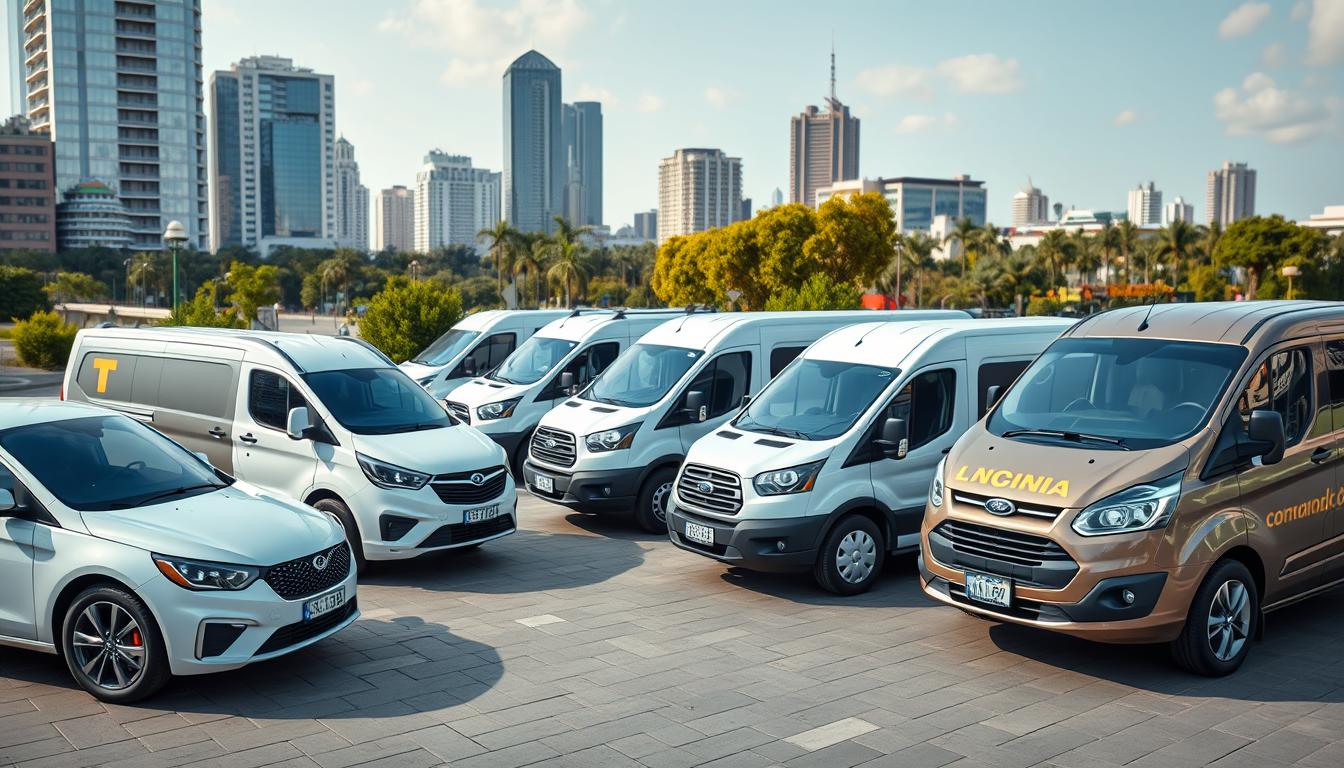Understanding company car finance is key for UK businesses. They can choose from cars, vans, tractors, and HGVs. The business vehicle funding options are varied, fitting different business sizes.
Options range from manufacturer deals to bank loans and leasing firms. Knowing the best financing can help upgrade your fleet.
Contract hire, hire purchase, and full payout leasing are popular choices. Some manufacturers offer discounts and 0% finance on new vehicles1. These options are flexible, with tax benefits and VAT reclaim opportunities2.
When choosing, consider the pros and cons of each. This ensures you make the best choice for your business’s needs and budget.
Understanding Business Vehicle Finance Basics
Businesses have many options for financing company cars3. They can save on taxes and get benefits like capital allowances. But, they also need to think about the Benefit in Kind (BiK) implications. Let’s explore the key points to help you make smart choices for your company.
Types of Vehicles Eligible for Finance
Business vehicle finance includes cars, vans, tractors, buses, and heavy goods vehicles (HGVs)4. This means businesses can pick the right vehicle for their needs. Whether it’s a few company cars or a big fleet of commercial vehicles.
Benefits of Professional Vehicle Financing
Professional vehicle financing has many benefits3. Businesses can update their fleet regularly and get discounts from manufacturers. They can also deduct expenses like fuel and insurance from their profits.
There are also tax benefits like capital allowances and VAT reclaims. These can be very helpful for businesses that use these financing options well.
Key Considerations Before Applying
Before getting into business vehicle finance, there are key things to think about3. You need to know what your company needs and compare different finance options. It’s also important to understand the tax implications4.
Asset finance solutions like hire purchase, leasing, and refinancing have different costs and benefits. Each option has its own advantages and things to consider.
By understanding business vehicle finance basics, companies can make choices that fit their financial and operational goals. This can help them become more competitive and profitable34.
“Navigating the complexities of business vehicle finance can be a game-changer for companies, unlocking new avenues for growth and efficiency.”
Contract Hire vs Contract Purchase for Business Vehicles
Businesses have two main choices for company cars: business contract hire (BCH) and business contract purchase (BCP). Both offer fixed monthly payments for 12 to 60 months. Many include maintenance packages for a set monthly fee5.
The main difference is in ownership. BCH lets businesses lease cars without owning them, passing on depreciation risk. BCP gives the chance to own the car with a final payment5.
| Feature | Business Contract Hire (BCH) | Business Contract Purchase (BCP) |
|---|---|---|
| Ownership | Lease – no ownership | Purchase – option to own |
| Monthly Payments | Fixed | Fixed |
| Depreciation Risk | Leasing company | Business |
| End of Contract | Return the vehicle | Make final “balloon payment”, extend, trade-in, or return |
| VAT Reclaim | Partial on monthly payments | Upfront on full purchase price |
Both BCH and BCP let businesses drive new cars with better fuel and safety. But BCH is often safer, more flexible, and tax-efficient than BCP5.
BCH is great for easy, cost-effective fleet management. BCP is better for companies wanting to grow their asset value5.
Business Vehicle Finance: Popular Funding Solutions
Companies have many ways to finance their business vehicles. Each option has its own benefits and things to consider. From deals with car makers to loans from banks and leasing agreements, there’s something for every business.
Manufacturer Direct Financing
Car makers often offer great deals like discounts and 0% finance on new cars6. This is a good choice for businesses wanting to grow their fleet or update old cars. They can choose from 1 to 7 years of financing, with loans up to £5 million6.
Bank and Specialist Lender Options
Besides deals from car makers, businesses can also look at banks and leasing companies7. These offer different financing types like hire purchase and lease, made for commercial vehicles7. Companies like Paragon have deep knowledge and can help find the best financing.
Lease Purchase Agreements
Lease purchase agreements are another popular choice. They let businesses pay for cars over time, with the option to buy at lease end6. This can save up to 25% through tax breaks, helping with cash flow and spending6.
Exploring these options helps businesses find the best way to finance their cars. Whether it’s growing the fleet, updating old cars, or saving on transport costs67.
| Financing Solution | Key Features | Potential Benefits |
|---|---|---|
| Manufacturer Direct Financing |
|
|
| Bank and Specialist Lender Options |
|
|
| Lease Purchase Agreements |
|
|
By looking at these options, businesses can find the best way to finance their cars. Whether it’s growing the fleet, updating old cars, or saving on transport costs67.
Sale and Leaseback: A Strategic Financial Option
For businesses looking to improve cash flow and use their vehicles better, sale and leaseback is a smart choice8. It means selling the fleet to a leasing company and then leasing it back. This way, businesses get quick cash to invest in their growth8.
One big plus is the chance to get tax breaks on lease payments, saving money8. But, leasing can cost more over time, especially with interest and fees8.
This option is popular in sectors like building, transport, real estate, and aerospace9. Companies with expensive assets find it helpful. It makes their balance sheet look better by reducing debts and increasing assets, without adding more debt9.
| Advantages for Seller-Lessee | Advantages for Buyer-Lessor |
|---|---|
| – Immediate access to cash for business use89 | – Guaranteed leases and stable income stream9 |
| – Potential tax deductions on lease payments89 | – Fair return on investment9 |
| – Improved balance sheet health9 | – Limited volatility risks of owning the asset9 |
| – Reduced debt load9 | – Reduced default risk10 |
But, there are downsides to consider, like losing money on the sale, affecting net worth, and long-term lease costs8. It’s key to make sure you can afford the lease payments to avoid financial problems8.
Changes in lease accounting rules, like FASB ASC Topic 842 from 2016, also affect sale and leaseback deals10. Companies must check if the deal meets the new rules to avoid being seen as a financing deal10.
Sale and leaseback can be a good move for businesses wanting to improve cash flow and use their vehicles better89. But, it’s vital to know the pros and cons and the new lease rules to match the company’s goals810.
“Sale and leaseback transactions can be structured in ways that provide benefits to both the seller/lessee and the buyer/lessor.”9
Understanding VAT and Tax Implications
Business vehicle finance can be tricky due to VAT and tax rules. These rules affect how a company buys and manages vehicles11.
VAT Reclaim Guidelines
VAT on business vehicles can be reclaimed in some cases. But, buying a car outright usually means no VAT back, unless it’s for taxi or driving school use11. Loans for buying cars also face big VAT hurdles11.
Yet, some vehicles are VAT exceptions. These include cars for one person, caravans, ambulances, and heavy vehicles12. Businesses can get VAT back for certain vehicles, like those for business use or taxi services12.
Tax Benefits and Considerations
Businesses should look at tax benefits of finance options. Hire Purchase Loans offer tax relief in the first year11. Buying outright also means tax relief in the purchase year11.
With Hire Purchase Loans, vehicles are assets on the Balance Sheet. But, personal car purchases limit tax benefits13.
Maintenance Cost Management
Maintenance costs are key in vehicle finance. Leasing can include these costs, aiding budgeting13. Leased cars can be business expenses, but with a 15% limit for high CO2 emissions13.
Knowing VAT and tax rules is vital for companies. It helps them use finance wisely and follow HMRC rules111213.
Fleet Management and Vehicle Investment Strategies
Effective fleet management is key for businesses to run smoothly. It means checking vehicle needs, having a clear policy, and going green14. Loans, leases, or hire purchase agreements help get vehicles without a big upfront cost. This makes things flexible and meets business goals14.
When planning for a company’s vehicle fleet, balance is important. Think about costs, like depreciation and maintenance, and what the vehicle might be worth later14. The right finance and risk plans, like tracking and maintenance, can reduce risks14.
Going green is also good for a company’s image15. Electric vehicle sales in the US might hit 70% by 2030, and production could too15. Fleet managers need to keep up with trends to meet green goals and customer wants16. In 2016, electric cars made up 0.4% of new registrations. By 2022, that number jumped to 16.6%16.
Regular checks and staying updated on trends help make smart vehicle choices14. Smart financing is vital for better operations and success14.

The future of commercial vehicle finance is exciting, with new fuel types, telematics, and innovation14.
Conclusion
Business vehicle finance offers many choices for companies in the UK. Options like contract hire and purchase help businesses grow and work more efficiently1718. Each choice has its own benefits.
It’s important to know about tax rules and long-term plans for company vehicles. Keeping up with market trends is also key. This helps businesses make smart choices about their vehicles1718.
Companies can find the right finance for vans, trucks, or buses. The business vehicle finance options, company car solutions, and UK fleet funding landscape is full of choices. Working with trusted providers helps companies make smart, long-term plans18.
FAQ
What types of vehicles are eligible for business vehicle finance?
Business vehicle finance is for many types of vehicles. This includes cars, vans, tractors, buses/coaches, and HGVs.
What are the benefits of professional vehicle financing?
Professional vehicle financing has many advantages. It allows for regular updates to your fleet. You might also get discounts from manufacturers.
What key considerations should businesses keep in mind when applying for vehicle finance?
Businesses should think about their needs first. They should compare different finance options. And they need to understand the tax implications.
What are the differences between contract hire and contract purchase for business vehicles?
Contract hire is great for updating your fleet often. It means you don’t have to worry about owning the vehicles. Contract purchase offers similar benefits but lets you buy the vehicle at a set price at the end.
What are the popular funding solutions for business vehicles?
There are several popular financing options. These include financing directly from manufacturers, banks, and specialist lenders. Lease purchase agreements are also common.
How does sale and leaseback work as a strategic financial option?
Sale and leaseback involves selling your fleet to a leasing company. Then, you rent the vehicles back. This gives you immediate cash and fixed monthly costs.
What are the VAT and tax implications of business vehicle finance?
VAT on business vehicles depends on how they’re used. You can fully reclaim VAT if the vehicle is only for business. Tax benefits vary based on the finance choice and the vehicle’s emissions.
How can businesses effectively manage their vehicle fleets and investment strategies?
Good fleet management means regularly checking your vehicle needs. You should have a clear policy for company vehicles. Also, think about green fleet options. Investment strategies should balance short-term needs with long-term goals.

















